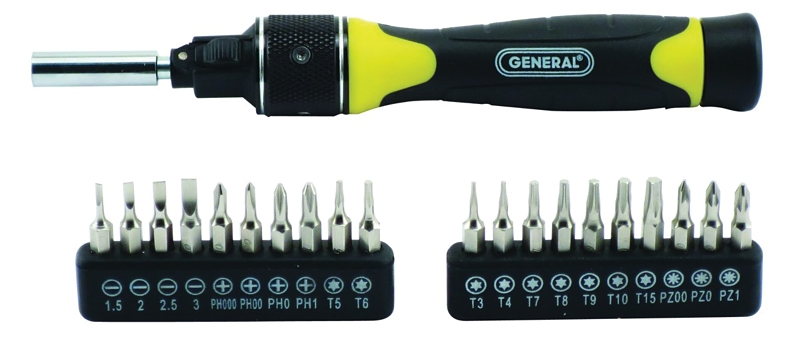GENERAL 70210 Ratcheting Screwdriver, Dual, Multi-Bit Drive, Hex Shank
Item #:
80064009
Product Info
70210
GENERAL TOOLS
02210 DRIVER RATCHETING EXPRESS BIT
GENERAL 70210 Ratcheting Screwdriver, Dual, Multi-Bit Drive, Hex Shank; 4EA/SHELF PACK
Incorporates a smooth ergonomic grip and a removable bottom cap for extra bit storage; the patented ratcheting mechanism allows the ratchet to drive screws twice as fast; the driver's tip rotates in the same direction, regardless of where the torque is being applied from, allowing for continuous torque which helps to maximize; to achieve double efficiency, simply hold the collar and rotate the handel clockwise and counter clockwise; convient slider switch reverse direction; includes (20) 0.5 (4mm) Hex Sh ank Precision bits.To drive a screw at double speed, hold the collar and alternately turn the handle clockwise and counter-clockwiseTo drive a screw at double speed, hold the collar and alternately turn the handle clockwise and counter-clockwise Slider switch reverses direction Patented mechanism drives screws twice as fast as an ordinary ratcheting screwdriver
Features and Specifications
- 1/16, 5/64, 3/32 and 1/8 in Slotted, NO 0, NO 00, NO 000 and NO 1 Phillips, T3, T4, T5, T6, T7, T8, T9, T10 and T15 Torx, PZ00, PZ0 and PZ1 Pozidrive Handle and (2) Bit Holders
- 6-3/4
- Hexagonal
- Ratcheting
| Drive Type | Dual Multi-Bit |
| Includes | 1/16 in 5/64 in 3/32 in and 1/8 in Slotted Bits PH0 PH00 PH000 and PH1 Phillips Bits T3 T4 T5 T6 T7 T8 T9 T10 and T15 Torx Bits PZ00 PZ0 and PZ1 Pozidrive Bits |
| Overall Length | 6-3/4 in |
| Shank Type | Hex |
Item Specifications
-
1/16, 5/64, 3/32 and 1/8 in Slotted, NO 0, NO 00, NO 000 and NO 1 Phillips, T3, T4, T5, T6, T7, T8, T9, T10 and T15 Torx, PZ00, PZ0 and PZ1 Pozidrive Handle and (2) Bit Holders
-
SCREWDRIVER SETS
-
Ratcheting
-
0.38 lbs per EA
Call for Pricing
NOT IN STOCK
UOM : EA
QTY:


